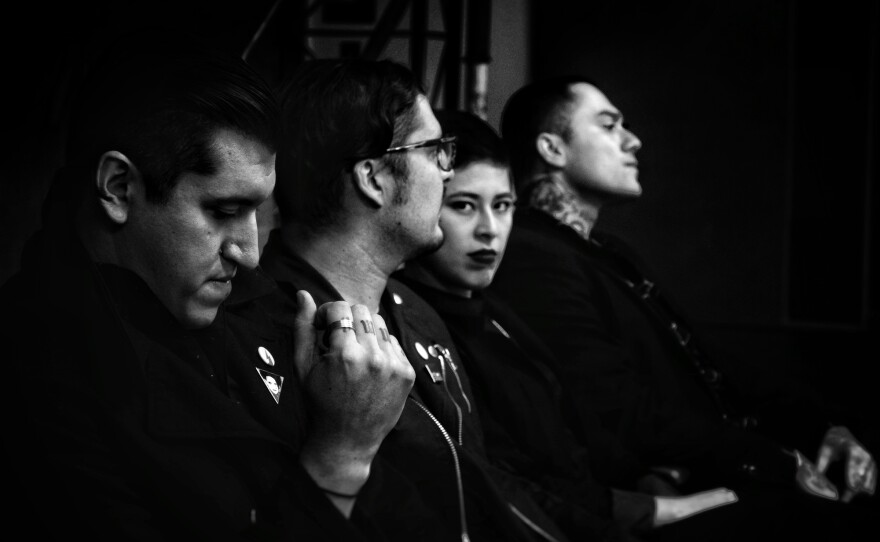Silent's latest album begins with the end — the hypnotic opening track, "End." The driving, sizzling bass only has a few seconds to set the dark mood before the guitar kicks in, somewhere between a surf-rock glissando and a metal screech. Then, vocalist Jung Sing takes over, his voice crystalline and sharp-edged, but still somehow soft.
"Modern Hate," the sophomore release from Mexicali-based darkwave, post-punk band Silent, packs a punch that's as haunting and brooding as it is spitting and incensed. The album title is part homage, part twist to David Bowie's 1983 anthem "Modern Love."
Formed in 2015 by Sing and guitarist Alex Lara, Silent now also includes Robo Ibarra on bass and drummer Rocio Chavez.
After releasing 2016's "A Century of Abuse," Sing started writing many of the songs on the new record right away, but without the band together, the lyrics wouldn't galvanize into full songs for some time yet. The pandemic is a difficult time to put out new music, but Silent was also up against taking time off as a band after the first album. Sing temporarily moved from Mexicali — the band's home — to Los Angeles.
"We didn't have the time to be together and write music," Sing said. "So we just stopped doing music for a year."
He soon moved back to Mexicali, but opened a bar and found himself caught up in that business. "So we lose another year," he said.

But eventually, they regrouped and began building the new album.
"We have a really, really, really cool connection when we write music," said Sing. They started with bits and pieces of songs, and worked to stitch them together into something cohesive. "The hard part was being all together in the same room to write a record," he added.
Inspiration for "Modern Hate," released on San Diego-based label Three One G Records, had first struck while touring, when then-President Trump announced he would start building the wall.
"I remember where I was when I wrote 'Hands on the Wall.' We were on the road, in the van and were listening to NPR and then the statement came on the radio," Sing said. Everyone in the van was enraged and switched the radio to music, but Sing couldn't let go — he climbed to the backseat, opened his laptop and began to write.
The track is dark and angry, rooted in the experience of living on the other side of that wall, and watching an ancient sort of hate bubble to the surface anew.
"As soon as I wrote the lyrics, I started writing more songs about that kind of hate," said Sing. He was prompted not just by the wall or toxicity in American immigration politics, but by other places he saw hate: the Las Vegas mass shooting that would happen shortly after he began writing the album, drug cartel violence in Mexico, racism and white supremacy, or even toxic relationships, to name a few.
"Hate is happening everywhere," Sing said.
One song, "A New Slave" sprang from the difficulties of recovering from an abusive, toxic relationship. A provocative and powerful video for "A New Slave" just released, directed by Mexicali filmmaker Christian Cavazos.
The track is highly personal to Sing. After an eleven-year partnership dissolved, he realized he needed to heal before moving on to someone else, or he'd risk looking for the next thing to make him feel that same way.
"First, I have to be happy by myself, with myself," Sing said.
Despite songwriting inspiration and a reunited band, the pandemic slowed things down. It also meant more personal strife for Sing, triggering a temporary closure for his bar, Small Bar in Mexicali. Like most small business owners, he struggled financially trying to keep the business afloat while closed, and didn't have U.S. government relief checks or funding to fall back on.
Layered on this was the psychological struggle that came from the loss of music, whether rehearsing and writing with the band or touring and performing.
But, it meant more time to fine tune the sound and concept of the album.
Their sound hints at acts like Savages, Nick Cave, Editors or even Depeche Mode, but Silent can't quite be pinned down to comparisons. Sing's voice is emotive and insistent, and despite the darkness and anger in the lyrics, the overall sonic effect takes on a more tragic beauty.
One short, interstitial track, "Erased," feels experimental, like an eerie instrumental soundscape. Another song, "Death is Not an Option," adds a more classic punk energy, while "The Witness" draws on the timelessness and theatrics of darkwave.
At a total runtime of under 35 minutes, it's a feat that the sound is never too much, or never relentless — spotlighted by the album's closer, "No Heaven." In the final minute, the music cuts out completely while Sing's voice, almost choral with a tremulous vibrato but also kind of feral, hangs over the silence.
"We have to be more brutal, and a little bit more aggressive, but at the same time, try to sound more mature in my singing," Sing said of the evolution of their sound in this new album. "We tried the process to be more fine or more elegant, but we're not losing the strength of the punk."
In their new work, this tracks, both lyrically and sonically. Despite all the fury, there's a lot of humanity, and a little hope, in the common grief.







